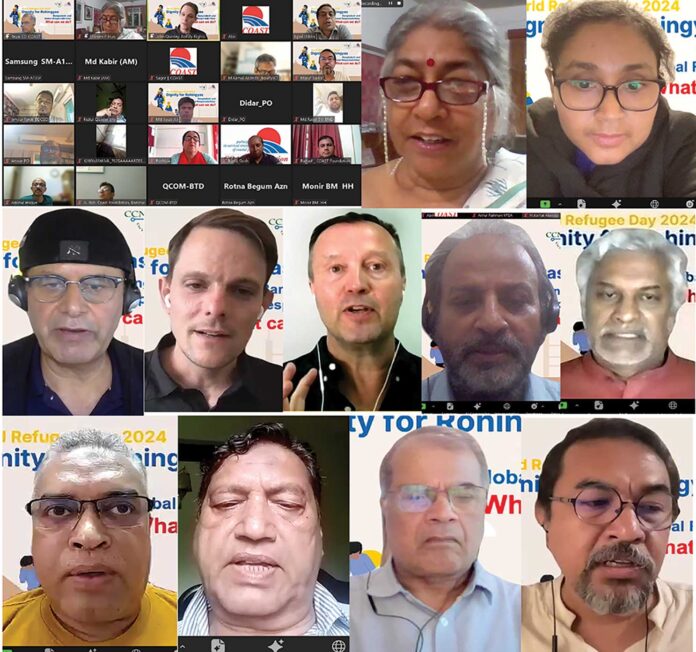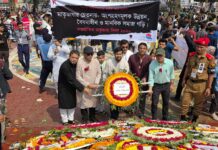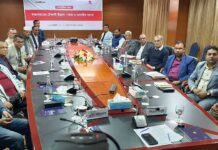Dignity for Rohingya refugees Demanded in COAST and CCNF seminar on World Refugee Day
Dhaka, 20 June 2024: Coast Foundation and Cox’s Bazar CSO-NGO Forum (CCNF) organised an online international seminar today observing World Refugee Day. Speakers there said that formal recognition as a refugee would solve many problems. Bangladesh has shown magnanimity by sheltering a million Rohingya refugees. Now they need a formal recognition.
National and international refugee experts spoke at the online seminar chaired by Shireen Haque of Naripokkho and moderated by Rezaul Karim Chowdhury of Coast Foundation. Among them are Klaus Dick Nielsen and Hafsar Tamizuddin of Asia Pacific Refugee Rights Network (APRRN), Gopal Siwakoti of InHUREED International, John Quinley of Fortify Rights, Gawhar Naeem Wahra of Disaster Forum, refugee and migration expert Asif Munir, Arifur Rahman of YPSA, Fazlul Qader Chowdhury of Cox’s Bazar Zilla Press Club, Jahangir Alam and Muhammad Bin Abdullah of CCNF. Barkat Ullah Maruf of COAST Foundation presented the keynote in the seminar. About five hundred workers involved in humanitarian work in Cox’s Bazar were present in this online seminar.
Barkat Ullah Maruf of COAST Foundation said during the keynote presentation Rohingya children are now provided with education. But they are less interested in that education as there is no internationally recognised certificate. He said that if the Rohingyas had travel documents, they would not have risked their lives to cross the Andaman Sea to go to other countries illegally. They would take a legal way for foreign jobs and could also take their families there.
APRRN’s Klaus Dick Nielsen said international agencies should provide funding to local NGOs in Cox’s Bazar to work on the Rohingya response. This is important.
Hafsar Tamizuddin, the Secretary General of APRRN, who was born as a Rohingya and lives in New Zealand, said that the Rohingya community is still being tortured in Maungdaw and Buthidaung in Myanmar. The international community is not very aware of it. She said we want transparency in the discussion about Rohingyas with other countries.
John Quinley of Myanmar-based Fortify Rights said the rights of assembly, and Freedom of expression are the major rights among the many rights for refugees, which are often undermined. If a family wants to move elsewhere to avoid security risks in Rohingya camps, that is their right.
Gawhar Naeem Wahra of Disaster Forum said that about ten million Bangladeshi refugees took shelter in India in 1971. India then recognised them as refugees despite not having ratified the Geneva Convention. Bangladesh can also follow that example and recognise Rohingya as refugees. He said, there is a benefit for Bangladesh recognising refugees. Expatriate refugees send money to the country through hundi. If recognised, they could have sent the money through the bank in a legal way. Foreign reserves of Bangladesh would have increased.
Asif Munir, a refugee and immigration expert, said, there is a negative mindset among our law enforcement agencies about Rohingyas as if they are criminals. He said that the ongoing conflict in the Rohingya camps cannot be dealt with by APBN alone. A disarmament process should be carried out with the help of other forces. This may require the intervention of the Ministry of Defence.
Gopal Siwakoti of InHUREED International said Bangladesh itself has many challenges as an LDC. It is a great magnanimity to shelter such a large population on it.
Shireen Haque of Naripokkho said, when I went to the camp in 2017, they used to talk about the torture they suffered in Myanmar. But now they only talk about the suffering that is going on in the camp. So, it has become bigger than what happened in Myanmar.
Rezaul Karim Chowdhury of COAST Foundation said that there is no other way to solve the Rohingya crisis except repatriation. International agencies should take meaningful initiatives for repatriation. He said that the Rohingya diaspora community can play a role in it. Fazlul Qader Chowdhury of Cox’s Bazar Zilla Press Club demanded transparency of the BRAC-managed pool fund and the 25% of the host community allocation.
Download Related Download [Bangla Press] [English Press] [CCNF Paper: Protracted to Pro-Life Approach in Rohingya Response] [Presentation: World Refugee Day 2024: Dignity for Rohingyas, Bangladesh and Global Responsibilities: What can we do?] [EquityBD Position Paper, June 2024: No Loan in Humanitarian Action. No More Debt for Bangladesh, Aid Transparency | Reduced Management Cost | Dignified Policy in Rohingya Response]
Newspaper














